Publications
When there are new challenges to rise up to, KAIST CAF will be at the very forefront.
Publications
Total : 59
-
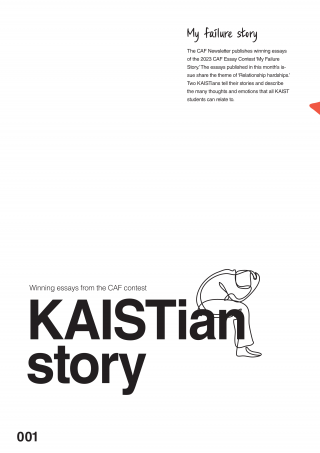 KAISTian StoryI Have Never Failed, Nor Have I Ever Succeeded
KAISTian StoryI Have Never Failed, Nor Have I Ever Succeeded2023-12-18
Hyein Jeong (School of Electrical Engineering of KAIST)
Winning essays from 2023 KAISTian Failure Story Contest Hyein Jeong (School of Electrical Engineering of KAIST) The idea of all things being empty and the fact that success and failure depends on one’s perception does not mean that one should try to self-justify everything, become complacent with reality, and make no effort whatsoever. Nor does it mean that we should consider all bad things as positive events. It means that nothing in the world is absolutely positive or absolutely negative. The main lesson is to not torture oneself by deeming empty things that are beyond one’s control as ‘definite failures.’
Origin
Download -
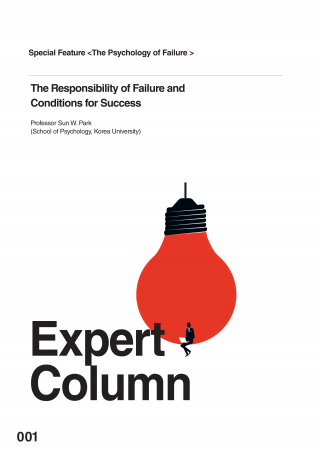 Expert ColumnThe Responsibility of Failure and Conditions for Success
Expert ColumnThe Responsibility of Failure and Conditions for Success2023-12-18
Professor Sun W. Park (School of Psychology, Korea University)
Special Feature <The Psychology of Failure > 3 The Responsibility of Failure and Conditions for Success Professor Sun W. Park (School of Psychology, Korea University)
Origin
Download -
 CAF Book ReviewTo Forgive Design: Understanding Failure By Henry Petroski
CAF Book ReviewTo Forgive Design: Understanding Failure By Henry Petroski2023-12-18
KAIST CAF
Origin
Download -
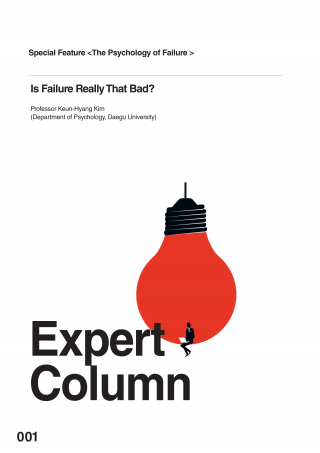 Expert Column
Expert Column2023-08-11
Professor Keun-Hyang Kim (Department of Psychology, Daegu University)
Is Failure Really That Bad? Special Feature <The Psychology of Failure > 2 Is Failure Really That Bad? Professor Keun-Hyang Kim (Department of Psychology, Daegu University) “Do you think success is that easy?”, “Is failure really that bad?” These are lines that parody off a rambling conversation between the main characters of the film <Decision to Leave>. My answer to both questions is “no” – success is definitely not easy, nor is failure that bad. However, it seems like there are plenty of people throughout the world who have achieved the difficult goal of success. Well, that is what it seems like on social media platforms like Instagram. On the other hand, even though failure is not as bad as we think, it still is not something people brag about, nor does it make us feel better. Because of these reasons, people who fail tend to avoid the spotlight and attention from others. The saying “people learn from their failures” has become so stale that people do not even bother to search for the lessons presented to them. Of course, not all life episodes have a clear-cut lesson on the surface, but they all can provide us with valuable insights if we look deeper; it is up to each individual to find and recognize them. You only live once, so rather than leaving our failures as painful and bitter memories, it would be better if we could slightly change our perspective (if it is difficult to transform a failure into something brighter, then at least try to change your mindset toward it – Koreans refer to this as a ‘mental victory’) to find silver linings in bad situations, which will help us recover psychologically and become more positive in life. With this in mind, I will give you list I made of some reasons why failure is not really that bad. Take note that my list does not consider the subject of the failure or the type of failure (e.g., breakups, loss of job, etc.).
Origin
Download -
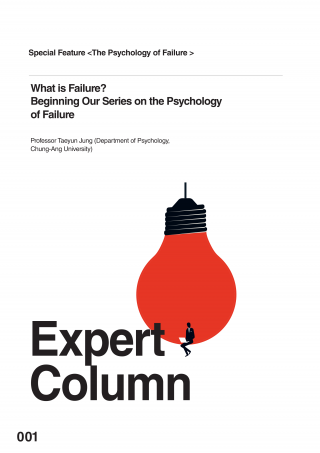 Expert ColumnWhat is Failure? Beginning Our Series on the Psychology of Failure
Expert ColumnWhat is Failure? Beginning Our Series on the Psychology of Failure2023-08-11
Professor Taeyun Jung (Department of Psychology, Chung-Ang University)
Special Feature <The Psychology of Failure > 1. What is Failure? : Beginning Our Series on the Psychology of Failure Professor Taeyun Jung (Department of Psychology, Chung-Ang University) We often assess the results of our actions as success or failure. On one hand, while such assessments are based on objective criteria, they can also be easily swayed by subjective opinions. If an outcome falls short of an objective set of standards or criteria, some may view the result as a failure, while others may describe it as a challenge. People also react differently to the result – some end up falling into despair while others see the result as an opportunity to try something new. What this tells us is that failure is not static and uniform; Rather, it can easily change depending on a wide range of factors. By widening our understanding of failure, we can explore more advantageous and adaptive ways to respond to our failure experiences.
Origin
Download -
 CAF Book ReviewThe Power of Failure Tolerance by Ah-Young Kim
CAF Book ReviewThe Power of Failure Tolerance by Ah-Young Kim2023-08-11
KAIST CAF
The Power of Failure Tolerance by Ah-Young Kim Published by Choice Book
Origin
Download -
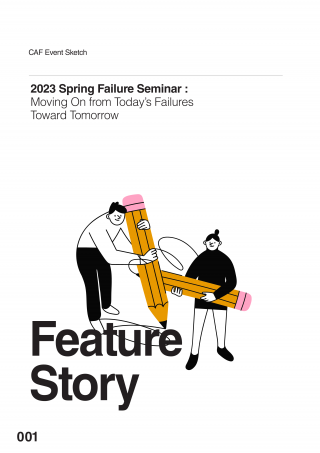 CAF Insight2023 Spring Failure Seminar : Moving On from Today’s Failures Toward Tomorrow
CAF Insight2023 Spring Failure Seminar : Moving On from Today’s Failures Toward Tomorrow2023-06-15
KAIST CAF
The third Failure Seminar was held on April 26th at the Yang Seungtaik Auditorium. The ‘Failure Seminar’ is a talk series hosted by the Center for Ambitious Failure (CAF) that invites leaders and pioneers from diverse fields to share their failure stories and perspectives with KAISTians, encouraging them to take on new challenges. The theme of the third Failure Seminar was “how to deal with everyday failures.” CAF invited Emeritus Professor Soonhung Han from KAIST, CEO of OGQ Chul-ho Shin, and Toss Content Manager Kyunghwa Jeong to share their insights with the audience. Professor Soonhung Han gave a talk titled ‘How to appreciate small failures’ with the hope that students can overcome their fear of failure and become more accustomed to small failures in their lives. Professor Han’s advice to KAIST students was to go out and experience small failures firsthand, even intentionally if necessary. According to Professor Han, this process cultivates the mental strength necessary to overcome failures, enhancing one’s capacity to deal with setbacks. KAIST alumnus and founder of OGQ (a content creator platform) Chul-ho Shin described his belief that the only person who can define the magnitude of an individual’s failures as well as their own personal threshold is the individual themselves. Recounting his story, he conveyed a message of hope: even if you repeatedly fail, as long as you are doing what you believe in with perseverance, luck and opportunity will find you one day. Kyunghwa Jeong, who is a Content Manager at Toss, is known for writing the book ‘An Out-Of-The-Ordinary Challenge,’ which chronicles the growth period of the now-famous Korean startup. As she described various episodes of the Toss team’s struggles, Jeong focused on the transformative impact of failure on both individual team members and the organization as a whole. Describing each episode with vivid detail, Jeong emphasized how each failure did not simply signify the end for the Toss team. She also discussed the attitudes that individuals and organizations need to adopt to leverage failure experiences as catalysts for change and growth. All three speakers spoke about the perspective with which we should view everyday failures and the importance of doing so. This article provides an overview of the insights shared by the three speakers (each representing different generations, fields, and experiences) regarding how we should view our failures of today within the broader context of life and what we need to do to persevere onward despite setbacks.
Origin
Download -
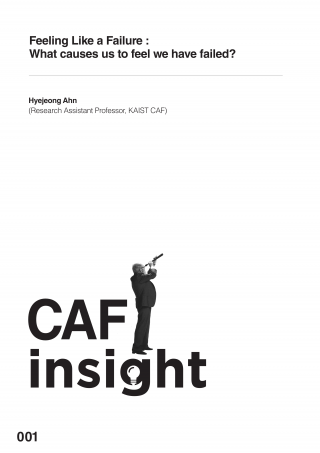 CAF InsightFeeling Like a Failure : What causes us to feel we have failed?
CAF InsightFeeling Like a Failure : What causes us to feel we have failed?2023-06-01
Ahn Hyejeong / Research Assistant Professor, KAIST CAF
The dictionary definition of the word ‘failing’ is ‘being unable to achieve what one intends or being unable to complete one’s goals or plans.’ Upon closer inspection of this definition, we can see that failures are instances that only occur when we intend to do something, set goals, or make some sort of attempt. However, when people, especially young Koreans, accumulate ‘failures’ throughout their journey, they often focus more on the emotion of ‘feeling like a failure’ more than the actual experience of failing to pursue or achieve a goal.
Origin
Download



